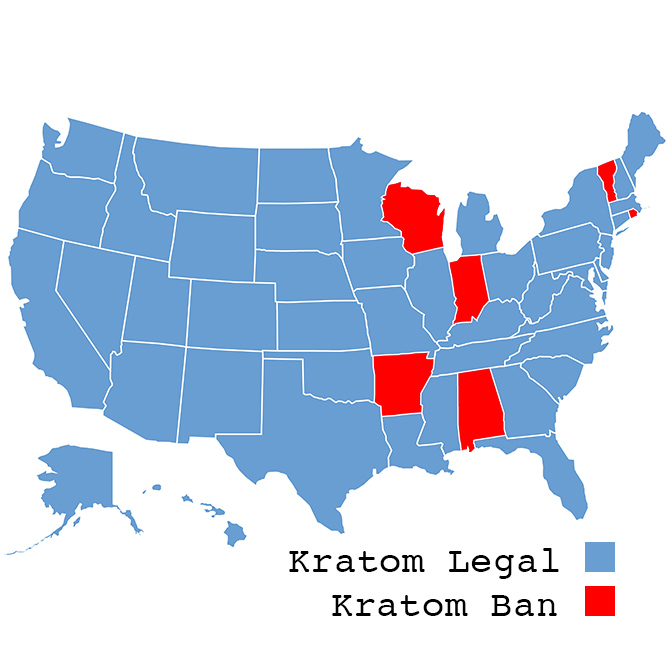The federal government tried to ban kratom back in 2016. The Drug Enforcement Agency (DEA) announced it was going to perform an emergency scheduling of kratom’s two primary alkaloids—mitragynine and 7-hydroxymitragyine—by placing them on the nation’s Scheduled List of Drugs, but the action was met by resistance from across the nation. The DEA, which found itself in the spotlight, backed down from the opposition and put the kratom ban on hold. But the threat from government legislation to keep citizens from kratom is far from over.
While kratom remains legal on the federal level, it doesn’t mean that individual states can’t ban kratom within their borders. They actually can. A few have tried, but it never came to fruition. Other state governments did outlaw the plant. Then later, those states repealed the bans. But at this very moment, six states have legislation on the books that make kratom an illegal substance.
Here at Kratom Geek, we want to make sure that never happens to anyone in our audience. So before you try to take kratom across state borders, you should research which states allow you to possess kratom products legally. So we’ll discuss which governments have issued a statewide kratom ban below.
Alabama
The new legislation, Senate Bill 226, was sponsored by Republican Senator Arthur Orr at the beginning of February 2016. And within a few months, the bill passed on May 4th, 2016. Then, a few days later, on May 10th, 2016, Alabama State Governor Robert Bentley signed the legislation into law.
The bill itself states:
“New synthetic substances are being created which are not controlled under the provisions of existing state law but which have a potential for abuse similar to or greater than that for substances controlled under existing state law. These new synthetic substances are called ‘synthetic controlled substances or synthetic controlled substance analogues’ and can be designed to produce a desired pharmacological effect and to evade the controlling statutory provisions. Synthetic controlled substances or synthetic controlled substance analogues are being manufactured, distributed, possessed, and used as substitutes for controlled substances.”
And it goes on to list mitragynine and hydroxymitragynine (sic) within the bill for synthetic substances. However, neither mitragynine nor 7-hydroxymitragynine is a synthetic compound. Both are naturally occurring alkaloids found in the kratom plant. Still, even though kratom compounds are not synthetic, the state law continues to view kratom products and the plant as an illegal substance in Alabama at this time. The addition of both molecules added onto the bill cements the ban.
Arkansas
The Arkansas Department of Health was notified by Dr. Thomas Atkinson, M.D., from the Springdale Treatment Center in Springdale, AR, that patients at the addiction treatment center had used kratom before. He informed the Department of Health that kratom exhibits an opiate agonist action in subjects. He believed the products shouldn’t be available from local Arkansas businesses. After hearing the doctor’s argument, the health department decided to take the matter into its own hands.
Both mitragynine and 7-hydroxymitragynine were placed as a scheduled I narcotic on Arkansas’s List of Controlled Substances. You can find both alkaloids listed under Article II—Schedule I—(c) Opium Derivatives. The two compounds were
The Department of Health’s Center for Health Protection held a public hearing on September 1st, 2015, where public comments were allowed on the subject, but when the comment period had expired, the Department of Health did not receive any public comments on the topic. So, the proposed bill went into effect on February 1st, 2016.
Indiana
The legislators in Indiana introduced Senate Bill 305 at the beginning of 2014. Three Republican Senators: James Merritt, Ronnie Alting, and Brent Steele authored the bill. It also had two other senators, Republican Senator Joseph Zakas and Democratic Senator Lonnie Randolph, to help co-author the measure. The proposed legislation became effective on July 1st, 2014.
The bill listed both mitragynine and 7-hydroxymitragynine under a section labeled as “Synthetic Drugs.” And for the proposal, it defined synthetic drugs as “a substance containing one (1) or more of the following chemical compounds, including an analog of the compound.”
But, as we all know, kratom is a naturally occurring tree in the rainforests of Southeast Asia. There’s nothing synthetic about either molecular compound. Regardless, the bill does not reflect the truth. So, to this day, Indiana state law still looks at the alkaloids in kratom as synthetic substances per the wording in the bill.
Rhode Island
Senate Bill 812 was introduced by Democratic Senators Elizabeth Crowley, Ana Quezada, and Susan Sosnowski in April 2017, and the Uniform Controlled Substances Act was signed into law by the governor on June 27th, 2017. However, the introduction of the bill went before the legislators without any kratom alkaloids listed on it. But the Director of Health sent a notice to the Secretary of State to add mitragynine and 7-hydroxymitragynine to the Controlled Substances Act behind closed doors.
The American Kratom Association was working with two of Rhode Island’s Democratic State Representatives, Brian Patrick Kennedy and Grace Diaz, to overturn the ban with House Bill 5542. They wrote and presented the measure, the Kratom Consumer Protection Act, in February 2019. But by March 2019, the House Committee on Health, Education, and Welfare recommended to hold the measure back for further scientific study. They tried again in January 2020. But the same thing happened.
Then Democratic Senator Joshua Miller introduced another version of the Kratom Consumer Protection Act, Senate Bill 2687, to the Senate Judiciary on February 27th, 2020.
Vermont
Kratom is an illegal substance in Vermont. According to legislation passed in the state, mitragynine and 7-hydroxymitragynine are both found under its list of regulated drugs. You can find both compounds underneath its section for hallucinogenic drugs.
The Vermont Legislature passed the legislation which went into effect later next year on July 15th, 2017.
At the moment, Vermont Legislature has a new bill up for discussion that might change how police enforcement handles kratom in the state. Vermont Progressive Party members Brian Cina, Robin Chesnut-Tangerman, and Zachariah Ralph banded together to propose House Bill 878 to Vermont Legislature in January 2020. Those members received support from Democratic Party Representative Annmarie Christensen. The referral of the bill went to the Committee on Judiciary.
Unfortunately, the bill doesn’t make kratom legal once again for Vermont citizens. It would only decriminalize it. But there’s more to the proposal than just decriminalizing kratom. It looks to decriminalize other substances, too. Drugs commonly used for medicinal, spiritual, religious, and entheogenic purposes get the same treatment in the bill. Those other three substances that the bill looks to include in its decriminalization effort are psilocybin, peyote, and ayahuasca.
Wisconsin
Out of the six states that have banned kratom, Wisconsin was the first to do it. Back in 2013, five senators would join forces to limit the rights of Wisconsin citizens. And Senate Bill 325 had bipartisan support in the Wisconsin Senate. Republican Senators Shelia Harsdorf, Neal Kedzie, and Richard Gudex sponsored the bill. Coming across the aisle to lend their support was Democratic Senators Julie Lassa and Robert Jauch. The bill even had bipartisan support from its cosponsored representatives, too. After its introduction, another eleven Republican and nine Democratic Senators would back the proposal. And shortly after the bill passed, the governor signed it into law in April 2014.
The legislation made both mitragynine and 7-hydroxymitragynine Schedule I Substances on Wisconsin’s Controlled Substance Act. However, back in October 2019, the state’s Committee on Health and Human Services held a hearing on a few different subjects: kratom was one of them.
Always Keep Fighting for Kratom Legalization
All six of the aforementioned states passed legislation to ban kratom for purchase, sale, or possession within their borders. So anyone living in those states should pursue efforts to make sure your local government does not infringe upon your rights forever. We need to put pressure on state legislators to lift the kratom ban.
Take the time to speak to as many representatives as possible in person. Send them correspondence to let them know you mean business. And follow up with any of the emails or messages you’ve sent them. Should a representative enter an election year, ask them where they stand on the issue. Many politicians make promises during their campaign periods they never intend to fulfill. Politicians show their true colors when they don’t support kratom legislation, and voters should respond accordingly.
In the meantime however, everyone should obey all the laws where they live—the same for doing business in states.






